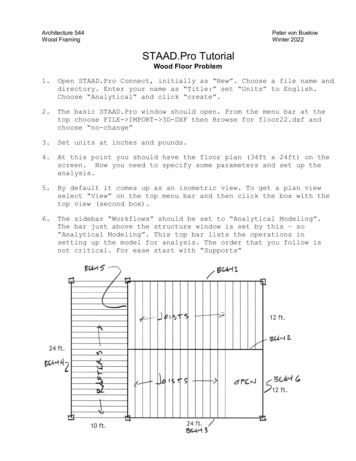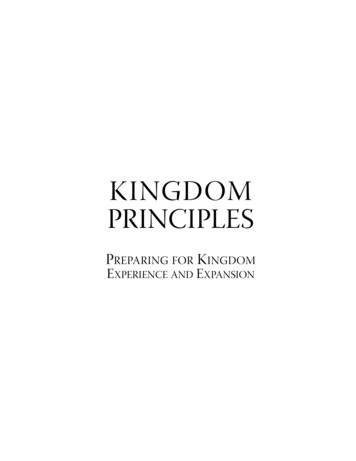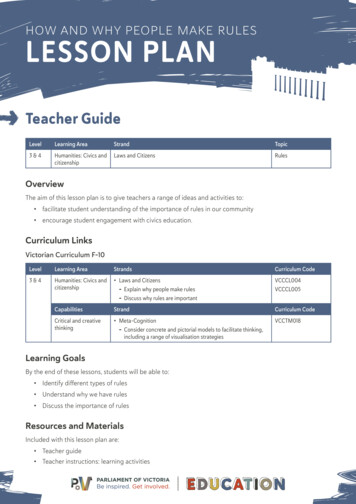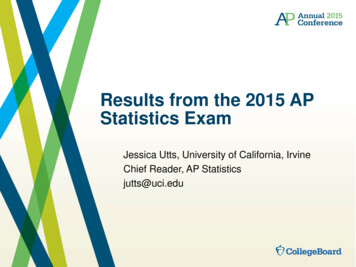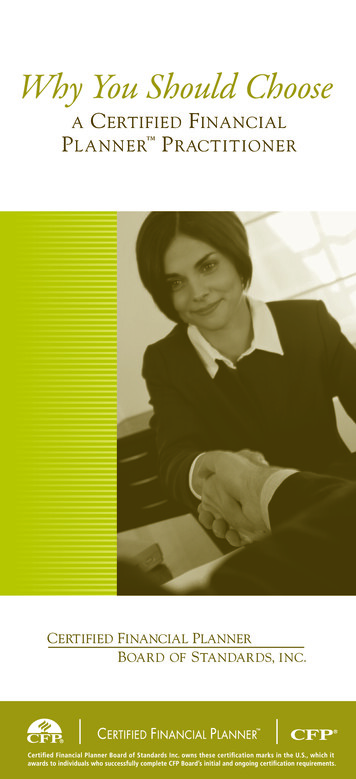
Transcription
Why You Should ChooseA C ERTIFIED F INANCIALP L A N N E R P RAC T I T I O N E RC ERTIFIED F INANCIAL PLANNERB OARD OF S TANDARDS, I NC.
Choosing a financial planner may be one ofthe most important decisions you make foryourself and your loved ones. Financialplanners can provide you and your familywith guidance over your lifetime, or work withyou to address specific concerns as needed. Aplanner can play a central role in helping youmeet your life goals and achieve financial wellbeing. Consequently, take the time to select afinancial planner who is competent andtrustworthy, one on whom you can depend forprofessional advice and services. Your futuredepends on the choices you make. Theinformation in this brochure is intended tohelp you choose wisely.It’s your future. Plan it!
Marks ofQUALITYCFP , CERTIFIED FINANCIAL PLANNERTM andarecertification marks owned in the U.S. by CertifiedFinancial Planner Board of Standards Inc. (CFPBoard), which can help you identify financialplanners who are committed to competent andethical behavior when providing financial planning.Individuals certified by CFP Board have taken theextra step to demonstrate their professionalism byvoluntarily submitting to the rigorous CFP certification process that includes demandingeducation, examination, experience and ethicalrequirements. These standards are called “the fourEs,” and they are four important reasons why thefinancial planning practitioner you select shoulddisplay the CFP certification marks.Why are the CFP certification requirementsIMPORTANT?Most people think that all financial planners are“certified,” but this isn’t true. Anyone can call himselfor herself a “financial planner.” Only those who havefulfilled the certification and renewal requirementsof CFP Board can display the CFP certificationmarks. When selecting a financial planner, youneed to feel confident that the person you chooseto help you plan for your future is competent andethical. The CFP certification provides that senseof security by allowing only those who meet thefollowing requirements the right to use the CFP certification marks.1
CFP certificationREQUIREMENTSeducationEDUCATION:CFP professionals must developtheir theoretical and practical financial planningknowledge by completing a comprehensive courseof study at a college or university offering a financialplanning curriculum approved by CFP Board. Otheroptions for satisfying the education componentinclude submitting a transcript review or previousfinancial planning-related coursework to CFP Boardfor review and credit, or showing the attainment ofcertain professional designations or academic degrees.examinationEXAMINATION:CFP practitioners must pass acomprehensive two-day, 10-hour CFP CertificationExamination that tests their ability to apply financialplanning knowledge in an integrated format. Basedon regular research of what planners do, the examcovers the financial planning process, tax planning,employee benefits and retirement planning, estateplanning, investment management and insurance.experienceEXPERIENCE:CFP professionals must havethree years minimum experience in the financialplanning process prior to earning the right to use theCFP certification marks. As a result, CFP practitionerspossess financial counseling skills in addition tofinancial planning knowledge.ethicsETHICS:As a final step to certification, CFP practitioners agree to abide by a strict code of pro fessional conduct, known as CFP Board’s Code ofEthics and Professional Responsibility, that sets forththeir ethical responsibilities to the public, clients andemployers. CFP Board also performs a backgroundcheck during this process, and each individual mustdisclose any investigations or legal proceedingsrelated to their professional or business conduct.2
How does CFP Board’s Code of EthicsBENEFIT ME?Through the Code of Ethics, CFP practitionersagree to act fairly and diligently when providingyou with financial planning advice and services,putting your interests first. The Code of Ethics statesthat CFP practitioners are to act with integrity,offering you professional services that are objectiveand based on your needs. They are required toprovide you with information about their sourcesof compensation and conflicts of interest in writing.Ongoing certificationREQUIREMENTSOnce certified, CFP practitioners are required tomaintain technical competence and fulfill ethicalobligations. Every two years, they must complete aminimum 30 hours of continuing education to staycurrent with developments in the financial planningprofession and better serve clients. Two of thesehours are spent studying or discussing CFP Board’sCode of Ethics or Practice Standards. In addition tothe biennial continuing education requirement, allCFP practitioners voluntarily disclose any public,civil, criminal or disciplinary actions that may havebeen taken against them during the previous twoyears as part of the renewal process.3
What to expect when working with aCFP PRACTITIONERWhen you work with a CFP practitioner,you are the focus of the financial planningrelationship and your needs drive the financialplanner’s recommendations. CFP practitionersfollow certain standards – called Financial PlanningPractice Standards – when providing financialplanning. These standards are based on the sixstep financial planning process described below.This broad-based approach to financial advicedistinguishes financial planning practitioners fromother professional advisers who typically focus ononly one area of a person’s financial life.THE FINANCIAL PLANNING PROCESS Establishing and defining the client-planner relationship Gathering client data including goals Analyzing and evaluating the client’s financial status Developing and presenting financial planningrecommendations and/or alternatives Implementing the financial planning recommendations Monitoring the financial planning recommendations4When providing financial planning, a CFP practitioner has agreed to define the scope of thework she or he will do with you, explain anddocument the services she or he will provide,discuss the method of compensation and relay anyother relevant information. CFP practitioners arealso required to work with you to determine yourpersonal and financial goals, your tolerance forfinancial risk, and your time frame for achievingresults. Practice Standards also require a CFP practitioner to gather all necessary financialinformation about you when developing yourpersonal financial plan.
How much will itCOST?CFP practitioners can work in several settingsincluding small financial planning practices, largefinancial services firms, credit unions, banks andother financial institutions. Planners are compensatedfor the services they provide in different ways, aswell. Some are paid through commissions, and othersthrough fees or a combination of both. While allCFP practitioners are trained to provide you withcomprehensive financial planning services, somespecialize in one or more areas, or work with specifictypes of clients. Be sure to ask the planner how he orshe is paid and interview several candidates to choosethe one with whom you feel most comfortable andwho best meets your needs.What else should I remember when selecting aPLANNER?As more people call themselves “financial planners,”finding the right professional to address yourfinancial planning needs isn’t always easy. It’simportant to take your time when choosing afinancial planner, and before making a decision,become familiar with the planner’s business style andunderstand the level of services he or she provides.Look for a measure of the planner’s commitment toethical behavior and adherence to high professionalstandards. Look for a financial planner who will putyou and your needs at the center of every financialplanning engagement. Most importantly, look forthe CFP or CERTIFIED FINANCIAL PLANNERTM marks.5
Check to see if your planner is aCFP CERTIFICANTTo verify that your planner is authorized byCFP Board to use the CFP certification marks,call toll-free 1-800-487-1497or visit CFP Board’s Web site at www.CFP.net/search.Learn about financial planningONLINECFP Board's Web site, www.CFP.net/learn, is acomprehensive resource for financial planning,offering useful information for visitors at every stageof the financial planning learning curve. Interactivetools provide help for your personal situation,including changing jobs, managing debt, planningyour retirement and more. Join the eNewsletter forupdates and check back regularly to participate inpolls and quizzes.The information in this brochure is provided as a public service byCertified Financial Planner Board of Standards Inc. (CFP Board). Anonprofit certification and standards-setting organization, CFPBoard’s mission is to help people benefit from competent,professional and ethical financial planning.It’s your future. Plan it! is a service mark owned by CertifiedFinancial Planner Board of Standards Inc.This publication may be reprinted for educational and nonprofitpurposes only.C ERTIFIED F INANCIAL PLANNERB OARD OF S TANDARDS, I NC.1425 K Street, NW, Suite 500, Washington, DC 20005P: 800-487-1497F: 202-379-2299E: mail@CFPBoard.orgW: www.CFP.net/learnCopyright 2002 2009, Certified Financial Planner Board of Standards Inc. All rights reserved.
CFP certification marks. As a result, CFP practitioners possess financial counseling skills in addition to financial planning knowledge. ethics E T H I C S : As a final step to certification, CFP practitioners agree to abide by a strict code of pro - fessional conduct, known as CFP Board's Code of




![[Page 1 – front cover] [Show cover CLEAN GET- AWAY 978-1 .](/img/13/9781984892973-6648.jpg)


